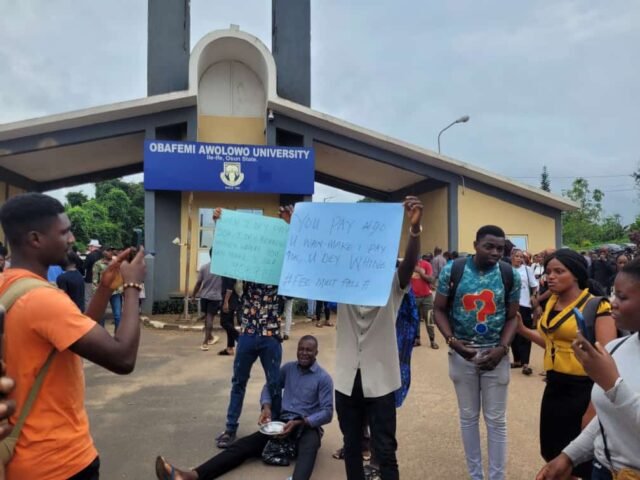In a decisive display of unity and civic-minded resolve, the Student Representative Council (SRC) of Obafemi Awolowo University (commonly referred to as “Great Ife”) has officially rebuked a growing trend of what it labels “academic abnormalities.” The SRC’s stinging public statement, voiced on behalf of the student body, demands that the university administration take immediate corrective action to restore a healthy and sustainable learning environment.
Table of Contents
Facing Early Mornings and Late Evenings: What Has Sparked Outrage
Students at OAU have signalled their concern over a recent pattern of scheduling irregularities imposed across the university. According to the SRC, these include:
- Compulsory 7 a.m. lectures, are often held before safe transportation is available.
- Classes stretching beyond 6 p.m., pushing students into exhaustion.
- The imposition of Saturday lectures, which encroach on family, religious, and personal time.
- Breach of lecture-free periods, originally intended to allow vital preparation time before exams.
The SRC asserts that these disruptions are neither academic enhancements nor beneficial to student welfare. Instead, they see them as violations of institutional norms and legal mandates.
Bold Statement from Student Leaders
In a strongly worded address, Rt. Hon. Oladapo Olakunle O. (Speaker of the SRC), along with Deputy Speaker Hon. David Joshua O., declared that these scheduling practices are unacceptable and must cease immediately. They reprimanded the university’s Division of Student Affairs and its highest officeholders—including Vice Chancellor Professor A.S. Bamire—urging prompt intervention.
One key excerpt from the statement reads:
“These abnormalities disrupt the balance between academics and other essential aspects of students’ lives… the lecture-free week is enshrined to ensure proper preparation and wellbeing.”
Students argue such impositions undermine core academic goals, causing unnecessary stress and eroding the time needed to engage in co-curricular and personal development.

United Student Leadership: A Camp-wide Call for Action
The SRC has initiated a campus-wide campaign, calling on class representatives, departmental coordinators, and fellow students to assist. They’ve requested that instances of infringing schedules be reported promptly, aiming to compile a credible record of violations.
Hon. Alawode Ewaoluwa E., Clerk of the SRC, emphasised:
“This is a collective fight. Unity is needed to safeguard the academic and social standards that define Great Ife.”
Moreover, a dedicated database is already under construction to document and quantify infractions, with plans to formally present the findings to the university Senate.
Momentum for Policy Redesign
Beyond protest, the SRC is actively proposing long-term solutions. In collaboration with Faculty Boards, they intend to develop an improved scheduling framework. The goal: safeguard student welfare, ensure effective time management, and respect transportation realities.
An anonymous SRC member told Nigeria Education News:
“We’re not anti-lectures; we’re for organized and fair academic practices.”
Indeed, other institutions have faced similar complaints from students, but Great Ife stands out for formally documenting concerns and pushing for structured reform.
Campus Echoes: Students’ Voice of Support
On lecture hall corridors and social media platforms, student voices echo the SRC’s position. A third-year student from the Faculty of Arts commented on the fatigue and logistical complexities students face:
“I had a 7 a.m. class today, and I barely made it due to transport issues. This action by the SRC is long overdue.”
Across the campus, peers are rallying behind the call—urging unity, seeking clarity on schedules, and demanding adherence to stipulated student welfare provisions.
Institutional Legacy Meets Emerging Challenges
OAU holds a proud legacy of student activism. From peaceful protests to engagement in governance, its Great Ife Students’ Union has often driven change. The current movement continues this tradition—asserting not just academic rights, but broader advocacy for student wellbeingt
Reaching for Vice Chancellor and University Leadership
While SRC’s statement was addressed to VC Professor A.S. Bamire and Division of Student Affairs, they also appealed to the university’s Chancellor and Pro-Chancellor—HRH Alhaji (Dr.) Yahaya Abubakar (Etsu Nupe) and Professor Siyan Oyeweso—to leverage their influence to address these grievances swiftly.
With July exams approaching, they hope leadership will respond immediately, restoring balance before schedules spiral further out of hand.
A Nationwide Reflection on Student Welfare
The action at OAU joins a broader national narrative: Nigerian university students are increasingly challenging academic practices perceived as harmful to mental and educational health. From Offa Polytechnic’s struggle against uneven practical sessions to EKSU’s engineering concerns, the industry is demanding greater respect for student needs.
However, Great Ife’s approach stands apart—it brings data-backed advocacy, policy proposals, and structured engagement with governance bodies.
Looking Ahead: What’s Next for Great Ife?
As tension builds and negotiations loom, here’s what to watch for:
| Phase | SRC Strategy | University Response |
|---|---|---|
| Documentation | Compiling a database of every issue to present to the Senate | Should enable transparent dialogue |
| Mobilization | Calls to class reps to report violations | May prompt administrative monitoring of lecture slots |
| Policy drafting | Working with faculties to redesign timetables | Compiling a database of every issue to present to Senate |
| Union escalation | Promise of stronger action if demands are ignored | May trigger strikes or sit-ins if unresolved |
The SRC underscores that their battle is not against academics, but for them to be delivered in an equitable, health-conscious, and student-aware way.

Final Take: A Defining Moment for Student Advocacy
By decisively rejecting “academic abnormalities,” OAU’s Great Ife students are making a defining statement: the health, time, and dignity of learners matter, and institutional tradition must evolve.
Whether university management will listen—and follow through swiftly—is at the heart of this unfolding moment. For now, OAU finds itself at a critical intersection of tradition, welfare, and academic integrity.
Join Our Social Media Channels:
WhatsApp: NaijaEyes
Facebook: NaijaEyes
Twitter: NaijaEyes
Instagram: NaijaEyes
TikTok: NaijaEyes
READ THE LATEST EDUCATION NEWS








































